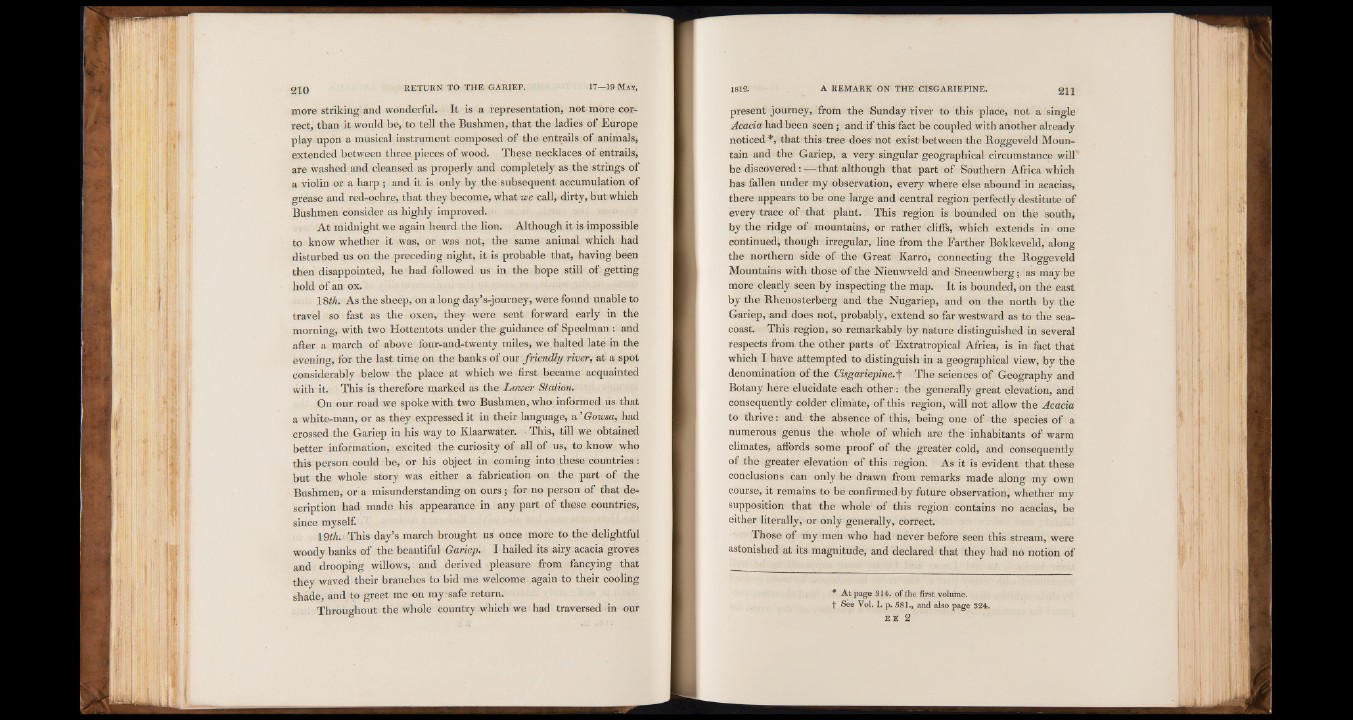
more striking and wonderful. It is a representation, not more correct,
than it would be, to tell the Bushmen, that the ladies of Europe
play upon a musical instrument composed of the entrails of animals,
extended between three pieces of wood. These necklaces of entrails,
are washed and cleansed as properly and completely as the strings of
a violin or a harp ; and it is only by the subsequent accumulation of
grease and red-ochre, that they become, what we call, dirty, but which
Bushmen consider as highly improved.
At midnight we again heard the lion. Although it is impossible
to know whether it was, or was not, the same animal which had
disturbed us on the preceding night, it is probable that, having been
then disappointed, he had followed us in the hope still of getting
hold of an ox.
18th. As the sheep, on a long day’s-journey, were found unable to
travel so fast as the oxen, they were sent forward early in the
morning, with two Hottentots under the guidance of Speelman : and
after a march of above four-and-twenty miles, we halted late in the
evening, for. the last time on the banks of our friendly river, at a spot
considerably below the place at which we first became acquainted
with it. This is therefore marked as the Lower Station,
On our road we spoke with two Bushmen, who informed us that
a white-man, or as they expressed it in their language, a ’Gowsa, had
crossed the Gariep in his way to Klaarwater. This, till we obtained
better information, excited the curiosity of all of us, to know who
this person could be, or his object in coming into these countries :
but the whole story was either a fabrication on the part of the
Bushmen, or a misunderstanding on ours; for no person of that description
had made his appearance in any part of these countries,
since myself.
19th. This day’s march brought us once more to the delightful
woody banks of the beautiful Gariep. I hailed its airy acacia groves
and drooping willows, and derived pleasure from fancying that
they waved their branches to bid me welcome again to their cooling
shade, and to greet me on my safe return.
Throughout the whole country which we had traversed in our
present journey, from the Sunday river to this place, not a single
Acacia had been seen; and if this feet be coupled with another already
noticed*, that this tree does not exist between the Roggeveld Mountain
and the Gariep, a very singular geographical circumstance will
be discovered: •— that although that part of Southern Africa which
has fallen under my observation, every where else abound in acacias,
there appears to be one large and central region perfectly destitute of
every trace of that plant. This region is bounded on the south,
by the ridge of mountains, or rather cliffs, which extends in one
continued, though irregular, line from the Farther Bokkeveld, along
the northern side of the Great Karro, connecting the Roggeveld
Mountains with those of the Nieuwveld and Sneeuwberg; as may be
more clearly seen by inspecting the map. It is bounded, on the east
by the Rhenosterberg and the Nugariep, and on the north by the
Gariep, and does not, probably, extend so far westward as to the sea-
coast. This region, so remarkably by nature distinguished in several
respects from the other parts of Extratropical Africa, is in fact that
which I have attempted to distinguish in a geographical view, by the
denomination of the Cisgariepine.f The sciences of Geography and
Botany here elucidate each other: the generally great elevation, and
consequently colder climate, of this region, will not allow the Acacia
to thrive: and the absence of this, being one of the species of a
numerous genus the whole of which are the inhabitants of warm
climates, affords some proof of the greater cold, and consequently
of the greater elevation of this region. As it is evident that these
conclusions can only be drawn from remarks made along my own
course, it remains to be confirmed by future observation, whether my
supposition that the whole of this region contains no acacias, be
either literally, or only generally, correct.
Those of my men who had never before seen this stream, were
astonished at its magnitude, and declared that they had no notion of
# At page 314. of the first volume,
f See Vol. I. p. 581., and also page 324.
EE 2